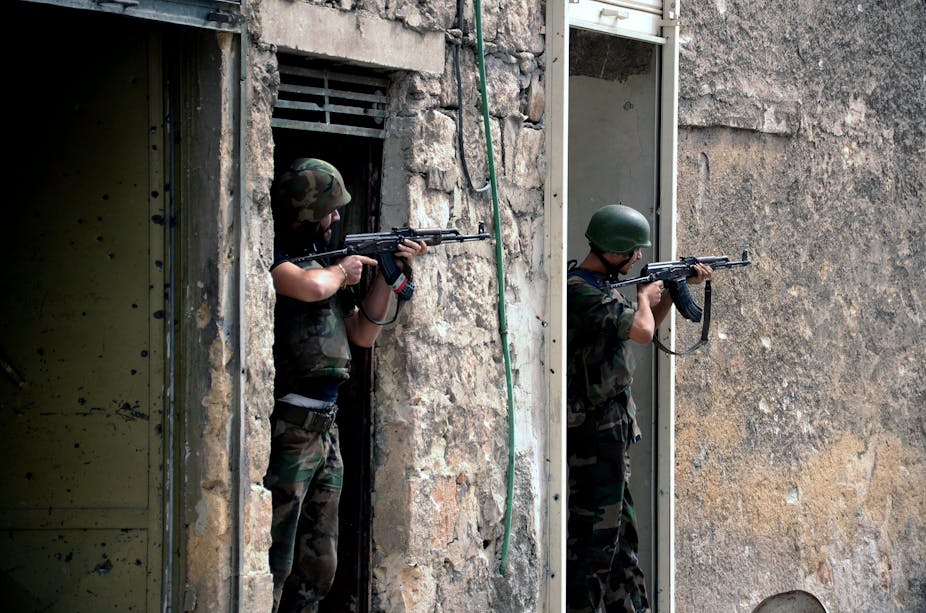The exchange of artillery fire between Turkish and Syrian forces over the past few days has seen a renewed focus on the possibility of an escalating war between Damascus and Ankara.
It seems that not since the days of the Gallipoli campaign has so much attention been paid to the military preparedness of Turkish forces.
While the Ottoman Empire of those days was a creaking relic propped up by the Germans, the modern state of Turkey has more fans of its martial capabilities. The sporadic shelling has generated both concern and, from some quarters, a certain gleeful anticipation, that the Turks might intervene and put a forceful end to the 19-month insurrection.
The heightened tension began a few days ago when pro-government forces lobbed a few mortar rounds into a Turkish border village. The Turks returned the compliment, and since that time there have been a handful of rounds exchanged daily.
With the Turkish PM, Recip Erdoğan, and his parliament saying that they reserve the right to use a forceful response to the shelling, war mongers have been beating the drums loudly, talking up the possibility of a full scale conflict. This has included seizing on some fairly reasonable comments by US Secretary of Defense, Leon Panetta, when he stated that there was a chance the Syrian conflict could spill over into adjacent states:
Whether or not that conflict begins to extend into the neighbouring countries such as Turkey remains to be seen. But, obviously, the fact that there are now exchanges of fire between these two countries raises additional concerns that this conflict could broaden.
This mild and blindingly obvious statement by Panetta has been beaten up by several media outlets as signalling an immediate Armageddon. Speculation has centred on the idea that Turkey will undertake a localised invasion of Syria to create a buffer zone, or invoke the NATO agreement to call upon other member states to aid it against Syrian aggression.
The possibility of Turkish forces marching into Syria and staying there is slight; mainly for the same reason that everyone else has resisted jumping in. The place is a chaotic mess, it would require some serious and long-term levels of military action, it would soon expose the occupying force to an Iraq-style Islamist insurgency and also present the certain risk of inflicting civilian casualties.

For all of those reasons, such a bellicose strategy from Ankara would be deeply unpopular, and this is one of the few places in the region where people actually get a free vote. Adding an unnecessary and lengthy war with Syria onto an impoverished budget would be electoral suicide.
It’s also unlikely that the USA (or Luxembourg or Iceland) are going to start pouring troops into Syria because the Turks have taken a few mortar shells. The mutual assistance clause in the NATO treaty was designed to respond to invasions from the Soviet Bloc, not cross-border idiocy from imploding Arab dictatorships.
After the knocks some member states have taken in Afghanistan fighting against tribal, ethnic and religious radicals, there probably aren’t many takers for doing the same in Syria, no matter how benignly dressed up the mission is in humanitarian clothes.
What Erdoğan does have to do though is talk tough and take a bit of proportionate action. In just the same way that any leader of any country would have to holler about reprisals if a neighbour was being nasty. Hence the tit-for-tat shelling and the “We won’t take this lying down” speeches.
However, Erdoğan and his cabinet are not silly. It’s not even certain who did the firing into Turkish territory, at least initially. Was it official Syrian forces or their hot-headed militia sock-puppets? There might even be concerns of rebel groups shooting from Syria in a bid to pull the Turks in on their side. Such minor and murky provocation is not worth getting the tanks rolling.
The parliamentary authorisation of cross-border action “when deemed appropriate” is a good compromise for the Turks. It means they can shoot a few howitzers and maybe launch a little air raid or two without going all the way into a full-scale invasion. Historically, the Turks have been willing to ignore borders in situations of reprisal or hot pursuit. On more than one occasion they’ve launched incursions and air strikes into Iraq as part of their fight against the Kurdish PKK.
This week’s exchanges of artillery across the frontier are therefore completely in character. It could be expected that we will even see a slightly more robust response if Turkey identifies a “clean” target in the vicinity: something that can be held up and shown to be a uncontestable example of compelling self defence and free from the danger of causing civilian deaths.
However don’t expect a simple end to the mess in Syria any time soon. Australia’s Foreign Minister, Bob Carr, speculated that it might take an inside-job assassination or a major defection to topple the Assad regime, and that might be the case. The Turks themselves favour the Syrian Vice President to take over, referring to him as a “wise and conscientious” leader.
But until the face on the stamps and banknotes changes, the munitions factories of Damascus will still be pumping out the bullets and shells.
And a few of them will land in Turkey.

